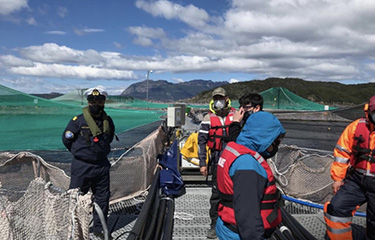Chile’s environmental watchdog opens new overproduction case against Australis

Chile’s Superintendency of the Environment (SMA) has opened a new sanctioning process against Australis Mar for exceeding the authorized production limits at one of its grow-out centers – the seventh such action taken by the environmental watchdog against the salmon-farming firm.
Australis Mar is a division of Puerto Varas, Chile-based Australis Seafoods, which was acquired in 2018 by Chinese foodservice giant Joyvio, a subsidiary of Legend Holdings.
SMA's latest investigation pertains to Australis’ Punta Lobos center, located in the Kawésqar National Reserve, in Chile’s southernmost region of Magallanes – an area that has been at the center of national attention, including a documentary produced by National Geographic that called for the reserve to be declared a national park, a move that would effectively ban salmon production there. According to the latest documents filed on SMA’s national information system for environmental control, SNIFA, Sernapesca – the country’s fisheries and aquaculture service – found that during the November 2017 through August 2019 production cycle the Punta Lobos center produced a total of 7,777 metric tons (MT) of Atlantic salmon, surpassing its environmentally permitted limit of 4,320 MT by 80 percent, or 3,457 MT.
SMA has six other sanctioning processes currently ongoing against Australis Mar: one for alleged violations at a salmon farm in the Biobío region, two for violations at grow-out centers in the Aysén region (Salas 5 and Costa), and three for alleged violations in the Magallanes region (Córdova 3, Estero Retroceso and Morgan). All three of Australis’ Magallanes farms involved in the sanctioning process are located within the Kawésqar National Reserve. The new case in Punta Lobos joins cases of alleged overproduction at Australis’ Córdova 3, Morgan, Estero Retroceso, and Costa farms.
“Regarding the SMA notification on alleged faults at the Punta Lobos farming center, located in the Magallanes region, related to a production cycle begun in 2017, the company is reviewing the background information that the authority has provided us to-date in order to collaborate and provide all the information that is necessary, thus building a correct and timely proposal for the compliance program if the observed deviations are confirmed,” Australis said in a statement sent to SeafoodSource.
According to current Chilean salmon-farming regulations, companies facing sanctions can agree to join an improvement program, which must include measures aimed at promoting satisfactory compliance with all environmental regulations. If Chilean authorities approve the proposal and the company adheres to the plan for a set period of time, the administrative sanction can be waived.
However, in the same accusatory document, SMA said it had also detected overproduction in the current cycle underway at Punta Lobos, which began in October 2021 and which is expected to end in January 2023. In August 2022, SMA found the Punta Lobos center had reached 4,443 MT of biomass, exceeding its limit by 123 MT, or 3 percent over the allowed maximum in its permitting documents.
“It should be noted that the previous cycle (2017-2019) reached overproduction at 14 months, out of a total period of 18 months, obtaining an average harvest weight of 7.3 kilograms. In the case of the current cycle (2021-2023), overproduction was reached in the eleventh month, obtaining an average weight of 3.7 kilograms for each specimen, so it is highly likely that upon reaching the end of the current cycle, the Punta Lobos grow-out center will register even higher levels than the overproduction registered in the 2017-2019 cycle,” the document, which was signed by Jaime Jeldres García, the investigating prosecutor in SMA’s Department of Sanctions and Compliance, said.
The two infractions attributed to Australis at the Punta Lobos center are categorized by SMA as serious, meaning the company faces a punishment that could include the revocation of the farm’s environmental permit, immediate closure of the farm, and a fine of up to the equivalent of CLP 3.62 billion (USD 3.9 million, EUR 3.9 million).
According to the SMA document, yet another breach detected by Sernapesca at Punta Lobos in March 2022 is related to the non-authorized use of physical mechanisms for the application of nanobubbles to modify oxygen levels in the farming center’s seabed. This, however, is considered a lesser infraction compared to overproduction.
Amid growing questions in Chile around the environmental sustainability of the country’s USD 5.2 billion (EUR 5.2 billion) salmon-farming industry, including by Chile President Gabriel Boric, regulatory authorities have stepped up their scrutiny of the industry’s operations. In July 2022, SMA filed a complaint against salmon farmer Marine Farm for overproduction and alteration of the seabed at operations of the salmon grow-out center Isla Partida, located in the Aysén region.
In a separate case, Punta Arenas, Chile-based salmon farmer Nova Austral faces sanctions that may cost it up to 20 percent of its total production capacity. After determining the farmer had overproduced at three of its centers – Cockburn 14, Cockburn 23, and Aracena 10 – SMA moved to revoke the environmental licenses for the three farms, all located in the Alberto de Agostini National Park. Nova Austral has said it may be forced to shut down its Chilean operations if the sanctions are implemented.
Photo courtesy of Chile’s Superintendency of the Environment






Share